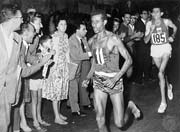Abebe was born in 1932 in a town called Jato about 130 kms away from Addis Ababa, in the district of NeA Denba near Debre Birhan. His parents were W/o Widnesh
Menberu and Ato Bikila Demssie. According to the tra dition of his enviorns, he spent most of his
childhood as a shepherd and a student. At the age of 12, he completed the traditional, "Qes" schooling. At this age, Abebe had already distinguished himself as an
exceptional "Gena" player. In 1952, young Abebe was hired by the Imperial Body Guard. At the Imperial Guard, he participated in both athletics and "Gena" game. In 1954, he married W/t
Yewibdar W/Giorghis with whom he fathered four children.
dition of his enviorns, he spent most of his
childhood as a shepherd and a student. At the age of 12, he completed the traditional, "Qes" schooling. At this age, Abebe had already distinguished himself as an
exceptional "Gena" player. In 1952, young Abebe was hired by the Imperial Body Guard. At the Imperial Guard, he participated in both athletics and "Gena" game. In 1954, he married W/t
Yewibdar W/Giorghis with whom he fathered four children.
Abebe spent a number of years with the Imperial Guard before he distinguished himself as a fine athlete. His
defining moment came when, once, he was watching a parade of Ethiopian athletes who had then participated in the Melbourne Olympics. Looking at these athletes who were wearing a sport outfit with the name
"Ethiopia" written at the back, he asked who they were. When told that they were athletes who represented Ethiopia in the Olympics, he was determined to be one
of them. In 1956, at the age of 24, Abebe participated in the national armed forces championships. The hero of the time was Wami Biratu who held the national records
in 5000 and 10000M races. During the marathon race, the crowd at the stadium was waiting to see Wami Biratu come as a winner. In the first few kilometers, Wami was leading. After a while, radio broadcasters
informed the crowd that a young unknown athlete by the name of Abebe was leading. As Abebe was extending his lead, the crowd waited anxiously to see this new sensation. Abebe easily won his first major
race and later on went to break the 5000 and 10000 Meters record held by Wami. With this impressive results, Abebe qualified for the Rome Olympics. Finally, Abebe's dream of wearing that sport outfit with
Ethiopia's name written at the back was realized.
Abebe's race in the Rome Olympics is what established him as a legend bigger than life and a household name
all over the globe. Not only he won the race, but also set a new world record at 2:16:2. He was also the first African to win an Olympics medal. Commenting on why
he run on bare foot, Abebe said, "I wanted the world to know that my country Ethiopia has always won with determination and heroism."
Four years later during the Tokyo Olympics, Abebe's
fame has already reached all corners of the globe. Six weeks before the big race that awaited him, Abebe was taken ill with Appendicitis. He underwent surgery amid a
public outcry for a proper medical council to decide on the procedure. The day he arrived in Tokyo, Abebe hadn't fully recovered from the surgery and limped his
way-down the stairs. However, the reception Abebe received from the Japanese people helped him recover rather quickly and unexpectedly.
Along with his colleagues, Mamo Wolde and Demssie
Wolde, Abebe resumed his regular training after few days of his arrival in Tokyo. The marathon race, particularly, the way Abebe won it barely six weeks after his surgery and the gymnastic display he showed
right after finishing the race victoriously is now a classic image engraved in the minds of hundreds of millions of people of this planet. This was also the first time ever
that the marathon race was won consecutively by an athlete. The new record of 2:12:11 that Abebe set was also an icing on a cake for this remarkable race.
Abebe trained hard for the Mexico City Olympics of
1968. Unfortunately, he had to withdraw from the race after running 15 kilometers due to bad health. His compatriot, Mamo Wolde would later finish the race victoriously.
Abebe had competed in more than 26 major marathon races in his illustrious athletic career. The world championships he won in 1960 and 1962 deserve special recognition.
In 1968, The legendary Abebe Bikila was involved in a car accident in the city of Sheno about 70 Km from Addis Ababa that left him paralyzed the waist below. Over the next 9 months, he was treated both in
Ethiopia and abroad. Even while in wheels, Abebe's competitive spirit and desire to see his country's flag hoisted high and proud helped him compete and win several races. In 1970, he participated in a 25 Km
cross-country sledge competition in Norway where he won the gold medal. Again, in the same tournament, he won a similar 10 Km race where he was awarded a special plaque.
The illustrious life of the legendary Abebe Bikila came to a tragic end in October of 1973 when he finally succumbed to a disease he had battled for many months. This eternal Ethiopian hero was buried in the
grounds of the St. Joseph church in the presence of a huge crowd and the then emperor, Atse Haile Selassie.

